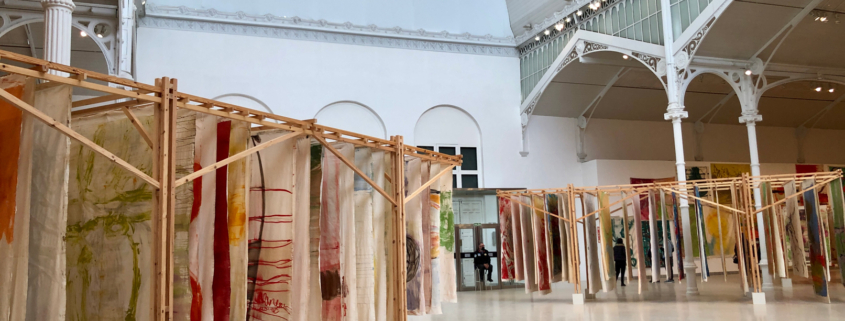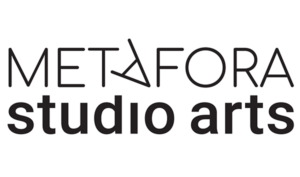
BLOCK 4: Welcome Spring! Join us for our annual art trip to Madrid!
Barcelona is a coastal city with a typical Mediterranean climate ranging from 10° to 15° during its coldest months. With this mild weather there is lots to do outdoors with many exhibition openings.
Block 4 coincides with Metàfora’s yearly art marathon in Madrid, where we visit the international art fair ARCO, as well as the most important galleries and museums. This 2-3 day trip is included in the fees for all-year students.
Below is an overview of the classes offered during Studio Block 4, 2021-22.
These classes are supplemented by Tutorials, Paint and Sculpture Lab (technical consultations), Presentations and Discourse Reviews, among other activities.
Scheduled classes for Block 4
Tools & Techniques (for All Students)
During every Block we offer an assortment of practical workshops from which students learn how to incorporate a variety of tools and artistic techniques in their work.
Miniatures – from reality to abstraction (Piotr Perski)
In this class Piotr introduces watercolors and explores the format of miniature painting.
Metal work (Oriol Texidor)
In this class students learn the exciting melting and joining process of the ARC welding. They become familiar with electrode rods, the power station and its three wires, and with grinding and polishing machines. Students practice of the starting spark, running a weld bead, cleaning and polishing the joint. Naturally, the class includes security systems and personal health protection while welding by making a small metal sculpture.
Video(Marc Larré)
This module serves as introduction to video editing and is dedicated to artists who have little or no experience in this field. During these classes students will import and organize footage, trim clips and add them to a timeline, use multiple tracks, use video effects and transitions, amongst others.
Life Drawing classes (Piotr Perski)
The life drawing classes are “the basics” for understanding model drawing: construction of the body, anatomy, composition, body expression. Students will also develop a series of drawings as art project, and Piotr divides all classes in small blocks to present different techniques and exercises. The program can change depends of the dynamic and necessity of the group. Over the academic year this class is a weekly ongoing event, and Piotr makes the most of this different dynamics to help students to develop their own expression and language in drawing.
Recent Art History / Theme (Foundation Program)
Every week the art students are exposed to different currents in Recent Art History. This class is obligatory for students on the Foundation program and open to all interested students. It is necessary to have passed this class to access the 2nd year of Metàfora’s Training Program. These lectures are aimed at encouraging students to build a personal discourse informed by what is happening in Contemporary Art.
The Trivial and the Meaningful (Recent Art History, Helena Pérez)
The debate around High-Low art in the 1960’s is still valid and is present as an underlying concern in most art produced today.
In an age of digital accomplishment and constant connectivity, we pursue an understanding in the student group of how such influences from early pop culture can be traced in almost everything we see.
Workshop (Certificate / Diploma)
This workshop is designed to nudge our Intermediate and Advanced level students out of their comfort zone and work with materials and reflection processes which they do not usually engage in. The workshops range from “The Materials I work with, the Ideas I investigate” to “Contemporary painting, even for those who do not paint” and are meant for pick at the students’ discourse and investigation into – perhaps – unknown territory. The class is obligatory to all 2nd and 3rd year students. If space is available, students from the Foundation Program can attend.
Contemporary painting, even for those who do not paint (Michael Lawton)
This class aims to question the way students see painting, challenging them to situate their work within a contemporary context. The class varies from the tools and techniques workshops, focusing on conceptual issues such as working from imagination, abstraction, and combining colors, including theoretical questions such as “what does it mean to make painting today?” and “what makes a painting look contemporary?”, amongst others.
Debate & Assignment (Certificate / Diploma)
This weekly debate group is designed for students on 2nd and 3rd year of the course. The contents of this space varies from block to block, sometimes it is more theoretical, other times more practical. Readings are usually recommended by the teacher. The class is obligatory to all 2nd and 3rd year students.
Link Seminar (Arash Fayez)
The Link Seminar is an opportunity for Intermediate and Advanced level students to examine their own discourse and try to formulate their ideas. Students present their own work comparing it to that of a/some influential artists to the rest of the group, with the intent of reaching a coherent artist statement.
Critical Theory (Certificate / Diploma)
This class is an organic follow up to the first year of Recent Art History. These weekly sessions are dedicated to transcendental areas and include recent critical theory in visual arts, such as Aesthetics, Postcolonial Theory, Queer perspectives, Feminist and post-feminist thought, Semiotics in Visual Art, and Psychoanalysis & the Subject. The class is obligatory to all 2nd and 3rd year students.
Zany, Cute, Interesting (Michael Lawton)
These theory classes use Sianne Ngai’s book “Our Aesthetic Categories: Zany, Cute, Interesting” as a starting point. “Ngai argues that three aesthetic categories usually considered of minor importance are crucial to understanding contemporary culture.
The categories in question, the zany, the cute, and the interesting, “are best suited for grasping how aesthetic experience has been transformed by the hypercommodified, information-saturated, performance-driven conditions of late capitalism.” In defense of this thesis, Ngai deploys a formidable grasp of the aesthetic theories of Schlegel, Nietzsche, Adorno, and Cavell, among many others. Her knowledge of more recent pop culture is equally wide ranging: readers will especially find illuminating her discussion of the zany Lucille Ball. Ngai aims to show how production, circulation, and consumption in contemporary capitalism are mirrored in the cultural world. She argues that the importance of the three marginal categories requires a revision of classical aesthetics. We need not abandon the beautiful and the sublime, but we need to give attention as well to what best enables us to understand today’s culture, thus lessening the gap between aesthetic theory and practice… Highly recommended for an academic audience interested in cultural and aesthetic theory.” — David Gordon ― Library Journal
À-Lab (Certificate / Diploma)
The Archive at MACBA (Arash Fayez)
This class, which most often adopts a seminar-like style, is meant to be somewhere between a theory talk and a practical workshop. During Block 4 the students visit the achive of Barcelona’s Museum of Contemporary Art.
Have questions?
Contact us for more information.
Ready to apply?
Follow this link for the application page.
.

